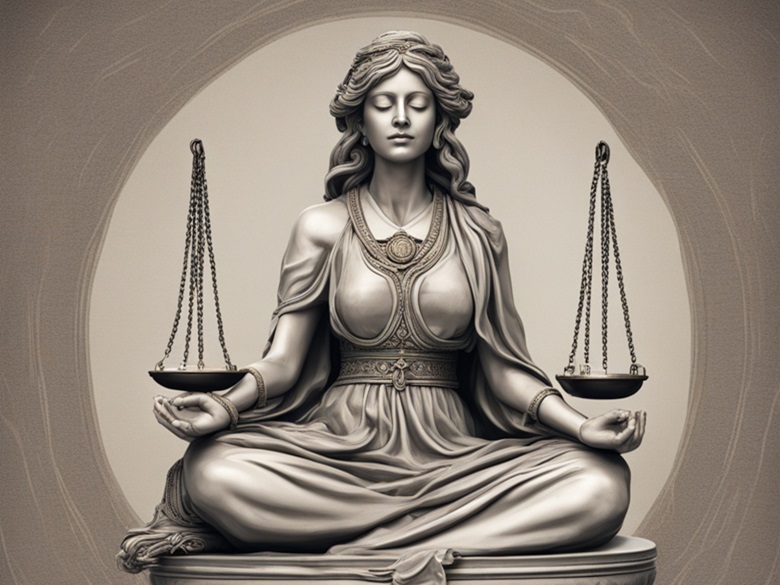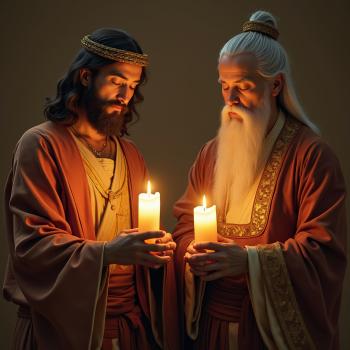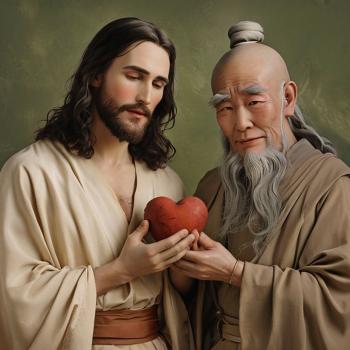Ever gone to a gym or school that declared itself a “Judgment-Free Zone?” Jesus and Lao Tzu call this therapeutic space “Wu-Wei.”

The Tao Te Ching begins its second verse with a few short lines cautioning the reader not to judge. The world is not divided into dualistic categories like beautiful and ugly, good and bad, being and non-being, difficult and easy, long and short, high and low, before and after. In fact, the spiritual person recognizes that these are all part of one another. In reality, all things are one with everything else.
Tao Te Ching – Verse 2
J.H. McDonald Translation
When people see things as beautiful,
ugliness is created.
When people see things as good,
evil is created.
Being and non-being produce each other.
Difficult and easy complement each other.
Long and short define each other.
High and low oppose each other.
Fore and aft follow each other.
Therefore, the Master
can act without doing anything.
and teach without saying a word.
Things come her way and she does not stop them.
things leave and she lets them go.
She has without possessing,
and acts without any expectations.
When her work is done, she takes no credit.
That is why it will last forever.
Detachment Isn’t Denial
The novice might view Lao Tzu’s words as terribly depressing, even saying that it’s horrible to detach oneself from beauty or goodness. But the Taoist doesn’t shrink from beauty. She smiles at it and sees it in its context along with ugliness. Neither does she avoid the horrifying thing that comes before her. Instead, she sees it in context with attractive things. Taoist separation or detachment isn’t denial—it’s the embracing of the fact that all things are one, instead of dividing everything into categories.
Deny Yourself
Jesus exemplified this detachment when he said, “If any wish to come after me, let them deny themselves and take up their cross daily and follow me. For those who want to save their life will lose it, and those who lose their life for my sake will save it.” To live is to die; to save your life is to lose it. You can’t have one without the other. Even in matters of life and death, the master learns to detach, to withhold judgment—for even life and death exist in the context of each other.
Christ is Not the Judge
Christ insisted that he was not the judge. Likewise, he told his followers not to judge anyone. “Do not judge, so that you may not be judged. For the judgment you give will be the judgment you get, and the measure you give will be the measure you get.” Then, he reminded his disciples to remove the log from their own eyes before trying to take the speck out of their brother’s eyes. Judgment, then, is only for those with perfect vision. That, of course, is none of us. Jesus and Lao Tzu both knew that ugliness is a construct for people who believe in beauty, and evil is only evil when it’s compared to someone’s idea of good. Judgment, then, is the folly of those who think they’re perfect.
Jesus Didn’t Like Labels
Jesus didn’t even like it when people judged him in a positive light. He rejected the title of “good,” even when it referred to himself. When someone called him, “good master,” Jesus corrected him, stating that no one is good, but God alone. If anyone had the right to accept such a title, it would have been Jesus. Yet, he rejected such a claim. In fact, he didn’t like labels at all.
A Matter of Perspective
Jesus knew that good and evil were a matter of people’s perspective, as they tried to label one another. He said that “John came neither eating nor drinking, and they say, ‘He has a demon.’ The Son of Man came eating and drinking, and they say, ‘Behold, a gluttonous man and a drunkard, a friend of tax collectors and sinners!’ But wisdom is justified by her children.” Jesus was aware that people judged him positively or negatively, based on their own perspectives. For his own part, instead of judging good and evil, Jesus practiced nonjudgment. If we join him in his abstention from judgment, we will be proven as children of Wisdom or the Tao.
What the Fall Really Means
It’s only from our limited perspective that we begin to label beauty and ugliness, good and evil. According to the Hebrew Bible, in the beginning, before the Fall, humanity existed in perfect innocence. It was only when they ate from the Tree of the Knowledge of Good and Evil (Differentiation) that humanity fell into the delusion that we were separate from our divine Source. At that point, humans began to differentiate between naked and clothed, light and darkness, inside and outside of the garden. The enlightened mind knows that darkness and light, being and non-being, positive and negative are all necessary movements of the universe. These things don’t need to be judged. They simply need to be accepted as the Way of life. To differentiate is to lose connection to the Way. This is what humanity’s fall really means.
Wu-Wei
Lao Tzu’s third stanza reflects a therapeutic space where the spiritual person can do everything with excellence and without much effort. This is the Taoist concept of Wu-Wei, which is translated as “Non-Action,” or “Non-Doing.” But Wu-Wei isn’t sitting around without activity. Rather, it’s being so adept at what you do that it seems perfect and effortless. It means having no regard for the success or failure of your work because you know that all things will fall into place. When you’re practicing wu-wei, you’re “in the flow,” so to speak. Runners would call it “being in the zone.” This is when you can do what you do without attachment to either the process or the results. This detachment is not passionless, as some may think. Rather, it is because you are so impassioned that you simply trust that the Way will have its way. That is why it lasts forever.
Jesus Wasn’t on Mission
Therefore, the Master wasn’t really on a mission at all. Jesus simply “went about doing good and healing all who were oppressed by the devil, for God was with him.” Most of his teachings and miracles were performed when he was on the way somewhere else. In other words, Jesus didn’t have to plan things out. He could “act without doing,” which is the Taoist concept of Wu-Wei. This does not mean inaction, but simply being present in the moment, and just doing whatever comes naturally.
Jesus accepted invitations to people’s houses. He ate and drank with anyone who was there, regardless of their social or religious standing. Jesus told stories, and he laughed. He responded to whoever approached him for healing, without setting out to begin a medical ministry. Where in the gospels do we find Jesus engaging in a strategic ministry plan, agonizing over just the right sermon illustration, or doing the paperwork to register as a nonprofit? Instead, his ministry was effortless. He spoke to those people who showed up in his life. He healed those who happened into his path.
Jesus’s Example of Non-Action
Jesus taught by example, and often without saying a word. He taught nonviolent resistance in the face of aggression. He demonstrated this in his willingness to suffer for the sake of peace. When things arise, let them come, he told his disciples. “But I say to you: Do not resist an evildoer. But if anyone strikes you on the right cheek, turn the other also, and if anyone wants to sue you and take your shirt, give your coat as well, and if anyone forces you to go one mile, go also the second mile. Give to the one who asks of you, and do not refuse anyone who wants to borrow from you.” This non-action was far from weak inaction. Instead, it was the even more difficult action of allowing.
Live like the lilies of the field, Jesus said. Have, but don’t possess. Allow both blessings and curses, but don’t expect people to treat you this way or that. Like Jesus, do the work and then forget it. Don’t demand credit. Trust in the Tao that will set all things right.
Becoming Amateurs
When we do this, we practice Life in its eternal context. Jesus did not differentiate between the saints and sinners but regarded all the same. Heaven does not differentiate between people. So, rather than labeling people, Jesus simply loved them. This is why his work was so effortless—because for him, it wasn’t work. It was simply walking in love. When we can do this, we become true amateurs—a word that means one who works for the sheer love of it. Everything you do becomes amateurish in the best sense. You don’t have to plan everything. You don’t have to strive for everything. Simply flow from an abundance of love, and everything seems to work out.
Something to Practice…
You can put non-judgment and non-action into practice in your own life by establishing a judgment-free zone. In your sphere of influence, you can let others know that you will do your best to engage them free from judgment. Consider setting up a “Judgment-Free Zone” sign at your desk. But you’d better be prepared to live by it!
You can practice non-judgment by refusing to act on snap decisions. Non-judgment and non-action combine when you practice the patience needed to deliberate before you act. Remember, non-action doesn’t mean inaction. It means wise, open-minded, and impartial action that follows the divine flow. When you practice non-judgment and non-action, you create a therapeutic space for everyone in your path.














